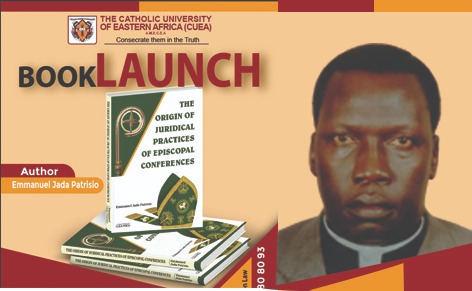KENYA: Canonist Cleric Emphasizes Collegiality of Prelates in New Book on Origin of Episcopal Conferences

Fr. Emmanuel Jada Patrisio
Sr. Jecinter Antoinette Okoth, FSSA
“My experience with Episcopal Conferences in Africa, Europe and America motivated me to give highlights on the history of these conferences and their responsibility in the universal Church,” the author of a recently launched book titled, “The Origin of Juridical Practices of Episcopal Conferences,” shared with AMECEA Online as he narrates his inspiration towards writing the book.
Fr. Emmanuel Jada Patrisio the author of the book underscores that the bishops and those working in the Episcopal Conferences need to understand that “As Conferences operate within the local environment, they are part of the universal Church, they are a universal figure and a bridge.”
In the five-chapter book, Fr. Jada a lecturer in the Institution of Canon Law at The Catholic University of Eastern Africa (CUEA) notes that the history of Episcopal Conferences is traceable “as a long existing institution of powerful decision-making within the Church.”
He narrates how Episcopal conferences originated way back in the last century and how their evolution came about during the Pontificates of Pius X, Benedict XVI, Pius XI and Pius XII. Additionally, the conferences development “is shown in the Vatican Council II and Post Conciliar document, as well as the 1983 Code of Canon Law and in the 1985 Extraordinary Synod of Bishops.”
Focusing on the collegiality of bishops in Conferences, the member of the Diocesan clergy of South Sudan’s Juba Archdiocese reveals that the companionship and cooperation of prelates who share responsibility, “Confirms the Constitution of the Apostolic College by our Lord Jesus Christ; that the Apostles in their mission as One Body are eyewitnesses of the revelation.”
In this way he explains, the Episcopal Conferences “in their activities express a dynamic application of the collegiality in regard to the Supreme Power of the Church and in the groupings of the particular churches in the Conferences.”
“There is this concept of collegiality when bishops come to a conference as a college to make decision. If a person is not for the proposed collective idea one is expected to abide since the decision is of the entire college,” Fr. Jada a member of Canon Law Commission at the Kenya Conference of Catholic Bishops (KCCB) explains the essence of collegiality.
According to the South Sudanese cleric, this backdrop gives highlight that Episcopal Conference is meant to assist the Church leaders carry out their pastoral work in Dioceses in uniformity with the Church.
The author of the book adds that the Conferences make laws and decrees “that help Christians carry out their roles as faithful in the church in some uniform way.”
Addressing those working in the Episcopal Conferences, the alumnus of Pontifical Urban University in Rome and a member of Canon Law Society of America (CLSA) shared with AMECEA Online that these people are not aware of the background and the spirit of the conferences hence the need for them to “know that bishops are the owners of the conferences and they (staff) are cooperators who support the bishops in their pastoral work in the Church.”
Other than the history of Episcopal Conferences and collegiality of the Bishops, the five chapters delve on the nature of the conferences, there legislative power according to Canon 455 and the magisterial power as stated in Canon 753.


